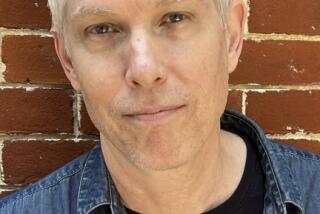Book review: Welcome to a strange, new-old world
The Witch of Hebron
A Novel
James Howard Kunstler
Atlantic Monthly Press: 334 pp., $24
Provided you make it out the other side of the apocalypse, what is it about today that you’ll miss the most? In James Howard Kunstler’s new novel, “The Witch of Hebron,” which is set “in the not-distant future,” a minor character known as the hermit mentally rhapsodizes over a long-gone pleasure, “the gigantic batter-dipped, deep-fried sweet onion he used to order on weekend nights in the old times” at the “Outback restaurant.” There are onions aplenty in “The Witch of Hebron” — one recurring bit of black humor revolves around a dead onion-wagon driver — but it’s not the produce that’s lacking, it’s the process.
“What a marvel that thing was!” remembers the hermit. “A gigantic sweet Vidalia split open by a cleverly designed patent device so that the onion layers formed petals like a great flower, allowing an eggy batter to penetrate every crack and fissure and then puff up magnificently when it met the hot fat in the Fryolater.”
It’s a longing for modernity at the most primal level — the gustatory. Kunstler’s end-times fiction mutes the particulars of What Happened in favor of fleeting glimpses of the world that was, what we, the readers, experience as a nostalgia for the present. (Either that, or it’s a superior ad for the Australian-themed steakhouse chain.)
“The Witch of Hebron” is a sequel to Kunstler’s 2008 novel, the evocatively titled “World Made by Hand,” and it shares that earlier book’s Hudson Valley setting and many of its characters. Kunstler ties up some loose ends here, but these leftovers are the weakest thing about “The Witch of Hebron.” The book’s initial weakness could also be a matter of a rough transition from “World’s” first-person viewpoint (that of Robert Earle, here a relatively minor presence) to a fitfully omniscient third-person perspective. My favorite bad sentence is “She had a handsome dish-shaped face with very large, questioning eyes,” though “Minutes later, he was in the central chamber of the new construction that had filled the courtyard between the two wings of the U-shaped modernistic high school” has its own exquisite dreadfulness.
These factors would seem damning, but luckily Kunstler’s storytelling chops win out. The “new times” are an epidemic-ravaged, post-oil, computer-free, agriculture-based era, but they also serve as a narrative tabula rasa onto which he can inscribe a story that, in outline and rhythm, feels more or less traditional. Which is to say that the biggest pleasure here comes from the interplay between two new characters, the bandit Billy Bones and the boy doctor Jasper Copeland, who could be at home in the Wild West, or 17th century Spain, or times and places even further afield.
The carryovers from “World Made by Hand” can feel like placeholders, and there is a degree of fuzziness to the constant prophesying (three characters are vouchsafed visions of the future) that is a little peeving. But once the self-mythologizing Billy Bones, who literally sings his own praises during holdups, recruits a reluctant and skeptical Jasper to be his protégé, the book takes off. Jasper is the 11-year-old son of the town doctor in Union Grove; after his dog gets stomped to death by a horse, he feeds the horse a lethal dose of opium and runs away from home. Complicating the matter is the fact that the horse belongs to the New Faith Brotherhood, hard-working but peculiar emigrants from Virginia. He contemplates relocating and setting up a medical practice, having learned procedures at his father’s feet.
Waylaid by Billy Bones (who sings “his introductory verses and then two more stanzas in his customary nasal drone”]), Jasper is unimpressed yet unable to escape his company, and this tension between these two strong personalities — a grandiose psychopath and a child trying to find his way back to goodness — gives the resulting picaresque its power. Kunstler never loses focus when he’s writing about the pair, and it’s through them that his strange new, old world, with its “vast, empty parking lots between the gutted strip malls, the shells of bygone discount palaces … all of it more a mute scream of history than an absence of noise,” at last comes alive.
Park is the author of “Personal Days,” a novel. His column Astral Weeks appears monthly at https://www.latimes.com/books.
More to Read
The biggest entertainment stories
Get our big stories about Hollywood, film, television, music, arts, culture and more right in your inbox as soon as they publish.
You may occasionally receive promotional content from the Los Angeles Times.






